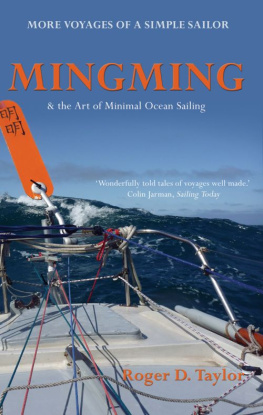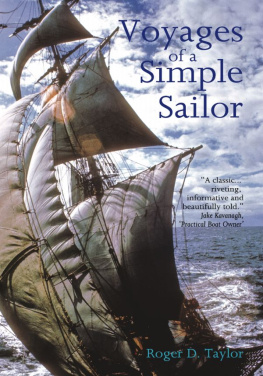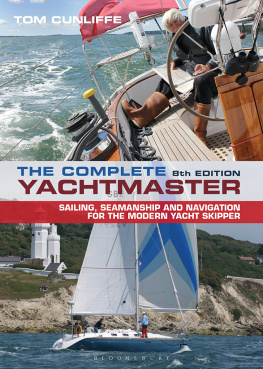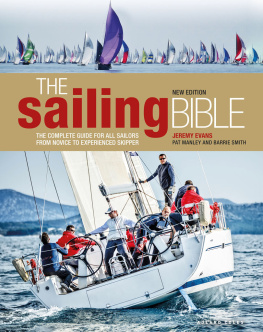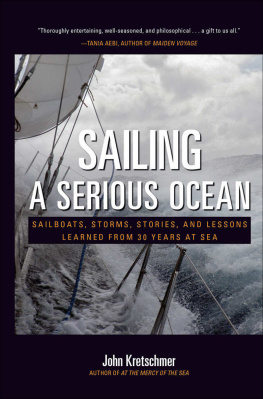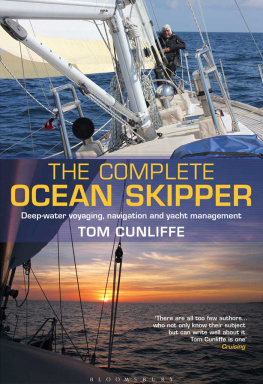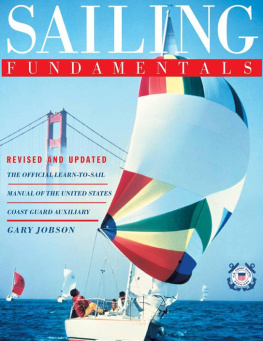Published by The FitzRoy Press 2010
F
The FitzRoy Press
5 Regent Gate
Waltham Cross
Herts EN8 7AF
All rights reserved. No part of this book may be reproduced in whole or in part (other than for purposes of review), nor may any part of this book be stored in an information retrieval system without written permission from the publisher.
Copyright 2010 Roger D Taylor
ISBN 978-0955803-512
A catalogue record for this book is available from the British Library
Publishing management by Troubador Publishing Ltd, Leicester, UK
To the memory of Mike Richey
BY THE SAME AUTHOR:
Voyages of a Simple Sailor
In order to minimise the cost and ecological impact of this book, colour photographs have been omitted. Photographs and video clips linked to this text can be found at www.thesimplesailor.com
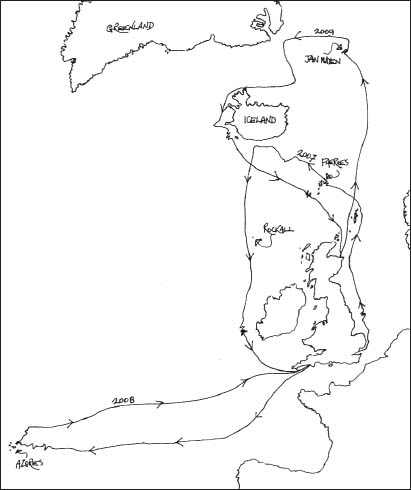
Mingmings Voyages 2007-2009
Preface
This world, my boy, is a moving world; its Riddoughs Hotels are forever being pulled down; it never stands still; and its sands are forever shifting.
Herman Melville, Redburn
The first book in this series, Voyages of a Simple Sailor, which serves as an indispensable introduction to the present volume, enjoyed the longest of gestations and the most startling of births. It sprang into the world, fully-formed and raring to go, in just a matter of weeks. It rather took me by surprise; I had long discounted the arrival of any literary offspring.
Having got the taste for writing, Ive been compelled to carry on. Its not been easier second time round; far from it. Inspiration has been replaced by dogged labour. Two thousand words of an early morning have shrunk to a hard-mined five hundred. Its been a tough task, but pleasurable nonetheless, for what greater pleasure could there be than to write about my little yacht Mingming? My affection for this tiny ocean-goer, and my gratitude to her for the adventures we have shared together, know no bounds. This book is a celebration of our partnership.
I have been driven too by another imperative: to show that ocean sailing which is simple, harmonious, unaggressive and patient can bring the richest of rewards. The modern sailor is too often drowned in a technological morass. Overload obscures vision. Digital excess veils the real world. Constant hurry induces blindness. My own preference is to spar lightly and directly with the ocean in a soft and sensual combat that allows me to know it better. My task is to observe it in its minutiae and to report its every nuance.
I dont always like the sea; sometimes I loathe it. Nonetheless, I am hopelessly under its spell. It always draws me back. It is only by writing about it that I can start to fathom the lure of this final, fragile wilderness.
PART ONE
WHALES
Their goal was unmistakable; they were heading straight for Mingming. The lines of leaping heads, spread across nearly a mile of sea, some now closing us fast, others still dark and intermittent smudges at the limit of my vision, were converging on a single point as accurately and as purposefully as if directed by some well-organised mission control. Perhaps they were. Whatever was driving them on towards us was unequivocal in its command; we were the focal point of this approaching horde. I had never, ever, seen anything like it. Wide-eyed, I watched them come.
1
I had long harboured a burning to sail north. It was the cold, the grey and the windswept that drew me. Bleakness exerted its charm. That I should want regularly to go to sea in an engineless yacht of Mingmings modest proportions already struck many friends as verging on madness. That my preferred destination was the far north confirmed me, in their eyes, in my insanity. I wasnt bothered. Sanity is an endless continuum; go far enough along the route to craziness and you are likely to meet good sense and mental rectitude plodding back the other way.
Whenever I pulled out my charts and ruminated on what might make a good voyage for Mingming for the summer of 2007, my eye was invariably drawn to the north. The cold and barren coasts of the Faroes, Iceland, Spitsbergen and the like exercised a magnetic attraction. The strangely euphonic Nordic names sprinkled sparingly in remote coves and deeply-carved inlets rang in my head like the dying clash of broadswords in some long-lost saga: Tjaldavik, Hvannasund, Trshavn, Stykkisholmur, Seyisfjrdur, Husavik. They spoke of something angular, four-square, solid, uncompromising. This was a world where pretension would be stripped bare, where a man would be found out for what he was.
In contrast, I was unmoved by the yachtsmans more conventional dream of sailing, for example, to the warm and balmy waters of the Mediterranean. I had no desire to join the flotillas, the sun-worshippers, the sippers of sangria and spumante. The prospect of all that earnest pleasure-seeking left me cold.
No, what I needed was a tough and meaningful challenge. The constraints of my business life meant that I could allow myself six weeks. Evening after evening throughout the early winter I studied the pile of charts I had ordered. Is there any greater delight, when the nights draw in, than to sprawl in front of the fire, a heavy Admiralty chart unfolded on the rug? Now everything is possible. Every sea can be traversed with the run of a fingertip. Headwinds count for nothing. Rocky headlands can be skirted without fear. Storms melt away. The ice-pack too. Great and wondrous voyages can be accomplished in a single minute. It is a time to dream.
Little by little the dreams were tempered into a practicable project. Hour upon hour of studying, thinking, measuring, of laborious consultation of the pilot books, led to a synthesis of the improbably extreme with the dourly possible. My wildest and most unformed notions were rubbed down relentlessly with heavy grit paper until they took the shape of something do-able. Therein, perhaps, lies one of the pleasures of planning a voyage at sea. It is an odd side-show. Somehow that romantic urge to drive oneself on across the furthest horizons must be reconciled to the dull and the sub-lunary the realities of time and distance and weather and boring worldly commitments and the not inconsiderable imperatives of survival. All is a finely balanced compromise. For months a great internal debate rages. The dreamer expounds his madcap schemes, his arguments rich in poetry and disdain for the bourgeois consideration. He would have us, if he could, sail non-stop to the moon. His restless imagination knows no bounds. The rationalist then steps in, implacable, unimpressed. He has every statistic to hand. He is the one that knows about wave heights and winds and weather patterns. He is an expert on victualling. He can calculate water consumption to the millilitre. He can tell you your average daily run from the year dot. He can shoot down every finely-turned but ultimately hair-brained point with a flurry of figures and boring, incontrovertible logic. To and fro the negotiations go. Bit by bit a deal is hammered out. Stalemate is not an option. For sail we must.
My plan took shape, therefore, and it was this. The primary objective would be to cross the Arctic Circle; this for no other reason than that it would keep me heading purposefully north. It would give me a latitudinal target of a whisker over 66N. With reasonably fair winds it would just be attainable within my tight time-frame of twenty-one days outward voyaging and twenty-one days homeward. From my home base at Burnham-on-Crouch it meant running up just over fourteen degrees of latitude a straight distance of a little less than nine hundred miles.
Next page
